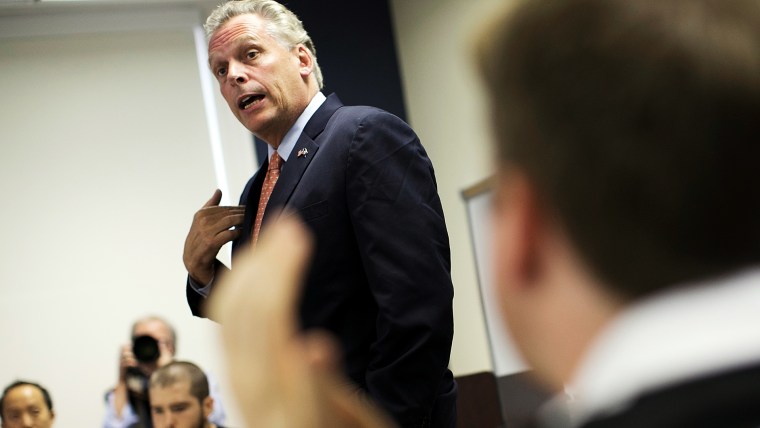Up until 10 days ago, Virginia was one of the nation's harshest states when it came to denying former felons the right to vote. That changed quickly when Gov. Terry McAuliffe (D) issued
a historic executive order restoring ex-felons' voting rights, opening the door to more than 200,000 Virginians to participate in their own democracy.
The
Washington Post added that McAuliffe's order, which covers former felons who are not on probation or parole, is believed to be "the biggest-ever single action taken to restore voting rights in this country."
Republicans weren't just outraged; they're also fighting to undo what's been done. The
Richmond Times-Dispatch reported this morning:
Virginia Republican leaders have hired a prominent conservative lawyer to lead an expected court challenge to Gov. Terry McAuliffe's recent order restoring voting rights for 206,000 felons. General Assembly Republicans announced Monday that they have retained Charles J. Cooper, a former assistant attorney general under President Ronald Reagan who was once named "Republican lawyer of the year."
"We have retained Mr. Cooper to examine the legal options to remedy this Washington-style overreach by the executive branch," Senate Majority Leader Thomas Norment Jr. (R) said. "Mr. Cooper is an extremely qualified attorney and we have every confidence he will proceed prudently, judiciously, and expeditiously."
The litigation will be
financed through a combination of "private and political funds, not taxpayer money."
And while state GOP officials have largely focused their criticisms on the breadth of McAuliffe's order, rather than the underlying policy itself, it's worth appreciating the racist roots of the voter-suppression policy Republicans are so eager to restore.
Matt Ford had
a piece in
The Atlantic last week on the history of Virginia's felon-disenfranchisement law, which was created by policymakers who made no effort to hide their racist intentions.
Many of Jim Crow's most pernicious aspects were swept away in a Second Reconstruction of sorts during the civil-rights movement of the 1950s and 1960s. But those efforts had little effect on the criminal-justice system and its role in enforcing white supremacy, both in the South and beyond it. Disenfranchising people with criminal convictions was one of many vote-suppressing tools deployed in the state's 1902 constitution, which was explicitly drafted and ratified to destroy black political power in the Old Dominion. [...] Black political suppression was neither an accident nor a mistake; it was the central purpose of the convention. Newspapers plainly reported it and politicians eagerly campaigned on it. "I told the people of my county before they sent me here that I intended, as far as in me lay, to disenfranchise every negro that I could disenfranchise under the Constitution of the United States, and as few white people as possible," R.L. Gordon told his fellow delegates during the suffrage debates.
Many of the policies adopted in pursuit of this goal -- literacy tests, poll taxes, et al -- were rejected over time through court rulings and federal civil-rights laws, but felon disenfranchisement remained in effect.
That is, until McAuliffe's executive order 10 days ago.
I don't doubt that Virginia Republicans and their legal team will insist that their sole motivation is about checking executive power and the amount of policymaking that can be achieved through executive actions. This is not, they'll argue, about race, discrimination, or protecting a voter-suppression law borne of racist motivations.
And those claims may very well be true. But the fact remains that this law was intended to keep people of color from casting ballots, and it's largely succeeded in its goal:
a fifth of the Virginia's black population has been disenfranchised by this law.
The lawsuit may be about testing the limits of state executive power, but sooner or later, the GOP sponsors of the case may want to explain why they're so eager to reinstate this antiquated, discriminatory statute.
